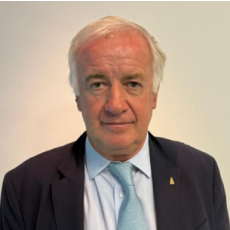Can you provide a brief overview of Roemmers Group for our readers who may not be familiar with your operations?
Roemmers Group, founded 123 years ago in 1921 by a German entrepreneur, is a pharmaceutical Company that has evolved from representing and distributing products in Latin America to building a robust network of locally-based companies, focused on manufacturing high-quality pharmaceuticals. Today, Roemmers is recognized for offering trusted, reliable products, combining a deep local presence with a consistent commitment to excellence across the region. Initially based in Argentina, the company now operates across Latin America, with a significant presence in Spanish-speaking countries and Brazil. Under the name Roemmers in Argentina, Siegfried in international markets, and Farmoquímica in Brazil, Roemmers has expanded its reach and product portfolio. The company focuses primarily on the primary care market, offering a wide range of pharmaceutical products and services that cater to various therapeutic areas, such as dermatology, nutrition, and over-the-counter products. Collectively, Roemmers controls about 14% of the Latin American market in pharmacies in units in Argentina, with a notable presence across several Latin American countries.
Our operations in Argentina include brands like Roemmers, Siegfried, Ceoderma, Ethical Nutrition, Gramon, among others. While the Roemmers brand is the most recognized by the public, our portfolio spans a broad range of products across multiple therapeutic areas, including dermatology and nutrition. Over the years, the company has expanded its footprint across the Latin American market, building robust capabilities in the manufacturing and distribution of pharmaceutical products in several countries. This growth not only enhances aces to essential medicines but also contributes to local economic development.
What distinguishes the Argentine pharmaceutical market from other global markets, and how do patents play a role?
The Argentine pharmaceutical market differs significantly from international markets, particularly regarding patents and bioequivalence studies. In countries like the United States, where patented drugs and bioequivalence studies are heavily emphasized, companies can dominate the market by securing monopolies and controlling prices. However, in Latin America, patents tend to be less relevant, as most of the market consists of branded generic products. These branded generics, which doctors are familiar with and trust, are prescribed as a consequence of their long-established presence in the market and the availability of products offered, which makes the bioequivalence studies a redundant cost in smaller markets like Argentina. In this context, the competition among pharmaceutical companies in Latin America is more focused on brand recognition and market trust rather than patent protection.
While large multinational companies often advocate for the inclusion of bioequivalence data, the Argentine market tends to prioritize affordability and broad access over formal demonstrations of identical efficacy. This approach helps keep medication costs lower, ultimately improving patient access without compromising trust in the treatment.
In Argentina, branded generic products are examples of high-quality generics that offer effective treatments at a fraction of the cost of their branded counterparts. They maintain strong trust among doctors and patients, while also competing with well-established players in the local market.
What challenges does Roemmers face in the Argentine pharmaceutical industry, particularly with regard to price competition and market regulation?
The pharmaceutical industry in Argentina is subject to intense price pressure, particularly from foreign companies that fail to meet Good Manufacturing Practice (GMP) standards and seek a more flexible regulatory framework that would allow them to import their products into the market. As a result, foreign medications—often lacking proper oversight and failing to meet necessary quality benchmarks—are sold at significantly lower prices.
In contrast, Roemmers operates through an extensive network of local manufacturing sites across Latin America, enabling rigorous quality assurance in line with the specific standards of each national regulatory agency. By prioritizing local production, Roemmers minimizes reliance on imports, maintains full control over its operations, and consistently adheres to stringent compliance protocols—delivering safe, effective, and high-quality pharmaceutical products to the region.
In Argentina, the regulatory environment is more stringent, particularly with the oversight of the National Administration of Medicines, Food and Medical Technology (ANMAT). While a flexible market would promote price competition, it does not always guarantee that product quality meets the standards necessary to safeguard patient health. Roemmers’s strategy of local production and distribution across multiple countries helps mitigate these risks and maintains high-quality standards while offering competitive pricing.
How has Argentina’s political and economic changes affected Roemmers, and what is your strategy for adapting to these shifts?
Although Argentina has experienced political and economic volatility in recent years, we are well equipped to adapt to these fluctuations, given our longstanding experience in the pharmaceutical sector. Roemmers has managed to remain resilient by maintaining a strong presence in Latin America. The current economic climate in the region presents both challenges and opportunities. While price controls and regulatory changes may disrupt certain parts of the market, we are well-positioned with multiple manufacturing plants across the region, ensuring that we are not overly dependent on any single market. By manufacturing locally, we are able to circumvent the challenges of importing and selling foreign products, giving us a competitive edge. Our focus on local manufacturing also helps to reduce production costs and streamline our supply chain, which can be a significant advantage in times of economic instability.
In response to these changes, we are actively expanding our footprint across Latin America. Roemmers’s strategy involves increasing market share in countries where we already have a presence, such as Mexico, Brazil, and Colombia, while exploring opportunities for growth in new markets. We are confident that with a strong local manufacturing base, a diversified portfolio, and a commitment to quality, Roemmers will continue to thrive despite the economic challenges in Argentina and across the region.
What distinguishes Roemmers’s approach to quality control and production, especially given the range of therapeutic areas you cover?
Roemmers takes pride in its robust quality control processes, which are crucial for maintaining high standards across its diverse product range. From primary care medications to specialized treatments, we ensure that every product meets stringent quality requirements. We operate multiple production facilities across Latin America, including plants in Argentina, Brazil, Mexico, and other countries, which enables us to maintain oversight of our manufacturing processes. This decentralized production model allows us to ensure consistent product quality while reducing dependency on imports.
Our commitment to quality extends beyond the production line. With a team of over 3250 medical visitors in Argentina and the rest of the region, we ensure that our products reach the right healthcare professionals and that they are properly prescribed to patients. This personalized approach, combined with our medical support network, ensures that doctors and patients trust Roemmers products. By focusing on localized manufacturing and distribution, we can offer affordable medications while upholding the highest standards of safety and efficacy.
Are there any specific therapeutic areas or geographic markets where Roemmers is looking to expand in the near future?
Looking ahead, Roemmers is focused on expanding in two key areas: specialized treatments and the nutritional market. We have already started to diversify into specialized treatments, including oncology and rare diseases, and we plan to expand these efforts across Latin America. These areas present unique opportunities, as they often require specific expertise and regulatory approval, but they also offer significant market potential. Moreover, we see significant growth potential in the nutritional sector, particularly in countries like Argentina, where demand for dietary supplements and specialized infant formulas continues to rise. Geographically, we are looking to strengthen our position in Latin American markets where we already operate. While our focus remains on countries like Mexico, Brazil, and Colombia, we also see growth opportunities in smaller markets across the region. The strategy is to deepen our market coverage in these areas by expanding our local manufacturing operations and increasing product availability, ensuring that Roemmers continues to be a trusted name and a well-known brand in Latin American healthcare.
What are the main challenges and objectives for Roemmers in the near future, and how do you plan to address them?
Our primary objective at Roemmers is to continue growing, both in terms of market share and geographic presence. We are particularly focused on expanding our reach across Latin America, where we already have a strong foundation. Our goal is to replicate the success we have had in Argentina and other markets, such as Mexico and Brazil, by increasing our market share and establishing a leadership position in key therapeutic areas.
The challenge lies in adapting to the ever-changing regulatory environment and economic conditions across the region. To address this, we continue to invest in our local manufacturing capabilities, ensuring that we can meet the growing demand for quality pharmaceuticals.
Additionally, we are expanding into specialized areas like oncology and nutrition, which will help us diversify our portfolio and create new revenue streams. By staying ahead of industry trends and focusing on long-term growth, we aim to solidify Roemmers’ position to continue to be a leader in Latin American healthcare.
What makes Argentina’s pharmaceutical market unique, and how does Roemmers benefit from being based there?
Argentina’s pharmaceutical market is unique due to its emphasis on social security and access to medicine. The country has a strong pharmacy network linked to the healthcare system, making it easier for patients to access prescriptions and discounted medicines. Unlike in many other countries, pharmacies in Argentina handle the transaction process with health insurance providers, which helps ensure that patients receive the medication they need at an affordable price. This system fosters a more inclusive healthcare environment, enabling both patients and healthcare professionals to benefit from improved access to medications.
For Roemmers, having its base in Argentina provides several strategic advantages. Argentina’s local market offers favorable conditions for our business model, driven by an established pharmaceutical network and a strong regulatory framework. Argentina’s pharmaceutical infrastructure, including its well-regulated pharmacies and social security systems, ensures that products are accessible to a wide range of patients, which is key to our success in the region. Additionally, the local market provides a solid foundation for expanding into other Latin American countries, as our experience in Argentina serves as a stepping stone for growth across the region.





